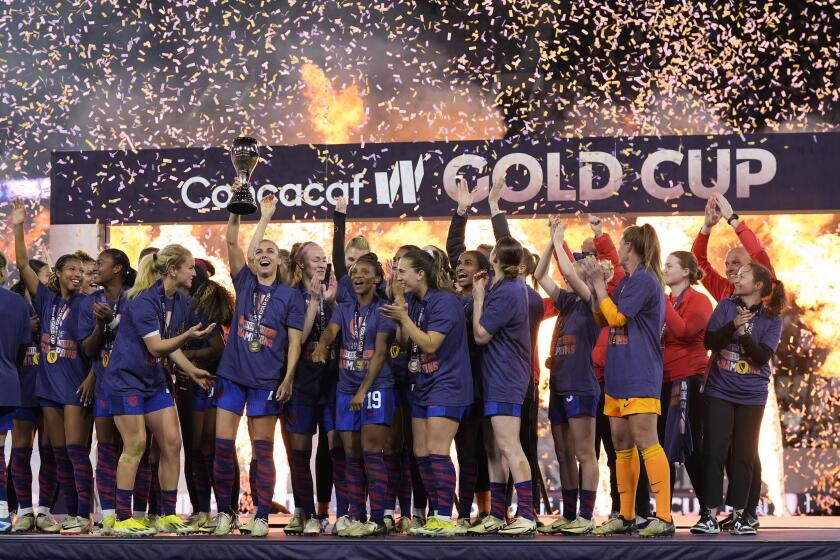Sweden’s Win Is No Sign of Progress
The myth is that the rest of the women’s hockey world is catching up to the U.S. and Canada, that the Finns and Swedes are no longer just cannon fodder for the sport’s two major powers and can actually compete with them.
The reality is that although the Finns and Swedes might have taken a half-stride forward here, the U.S. has regressed. That point was reinforced during its playoff semifinal loss Friday to a smart, well-coached Swedish team that drew inspiration from that most iconic of impossible dreams -- the 1980 U.S. men’s hockey miracle on ice at Lake Placid, N.Y.
Meanwhile, Canada, which will play Sweden for the gold medal Monday, is better than ever, having bowled over this supposedly improved field by a 42-1 margin in its first four games.
Any more progress like that, and women’s hockey will play itself off the Olympic program.
There has been no significant advance, only spin.
Several daunting problems remain before women’s hockey can claim to have made great strides. Perhaps most important is that no nations besides the U.S. and Canada devote much money or resources to their women’s hockey programs.
And that cultural biases and old stereotypes work against giving aspiring female players the same support male players routinely receive.
And that outside of the U.S. and Canada, there are few places where women can hone their skills in the four years between Olympic tournaments.
“We don’t have high school teams or college teams, like in the States,” said Swedish forward Erika Holst, who played at the University of Minnesota Duluth for four years and became a gym teacher when she returned to Sweden. “We have a club system and things are getting better, but it’s not like the U.S. colleges.”
About 10 players in the women’s tournament attended Minnesota Duluth, and standout Swedish goaltender Kim Martin is headed there. Six players on Team Canada honed their skills at U.S. colleges.
However, playing college hockey has yet to become an option for most young female hockey players outside North America. Until it does, the game’s growth will stagnate.
The U.S. team apparently was unable to mine the talent coursing through the college ranks. Its defense was shaky from the day Coach Ben Smith picked the team, and its inability to create and finish offensive opportunities was striking.
Yet, Smith repeatedly defended his decision to leave veteran forward Cammi Granato and gifted defenseman Shelley Looney off the roster, perhaps not realizing that the two veterans brought more than a good shot and ability to read the game. They brought leadership and composure and an ability to find ways to win, qualities the team he picked sorely lacked.
Sweden’s upset on Friday, the U.S. women’s first loss to a team other than Canada since the national team program was launched in 1990, was a product of good strategy and scouting. Sweden’s defenders blocked shots all over the ice, its players never gave up on 50-50 battles for the puck and it pressured a confused and lifeless U.S. team into committing turnovers in the defensive zone. They were fit and eager and motivated to believe anything was possible.
“Their team got stronger and stronger as the game went on,” Smith said. “That’s a credit to their team spirit. They competed their heart out.”
It was a great story. But in all likelihood, it’s a story that in Sweden will fade into oblivion the next time Peter Forsberg pulls a hamstring, which should be any minute.
Former NHL standout Mats Naslund, manager of the Swedish men’s team in Turin, said he doubted that the women’s triumph would ignite a hockey boom in their homeland.
“Of course, it helps,” he said. “But it won’t be a big, big sport for girls in Sweden right now. They are at the same level as women’s soccer was 10 years ago.
“They may make a few more kids play hockey, but they’re still youths. Give them 10 more years and it’s going to be exciting.”
Women’s Olympic hockey might not be able to wait that long. Although it’s not in danger of joining softball and baseball as an outcast, it won’t have any credibility unless it’s more competitive.
The talent gap that once separated the two North American teams from the rest of the world has shifted. Canada is alone on one side, with the U.S. a few steps behind. Every other country is lagging by a decade or more.
The U.S. team that will play Finland for the bronze medal Monday never developed an identity or style. This group was neither young nor old, never sure defensively and never consistent on the power play.
Defenseman Angela Ruggiero, a Simi Valley native and three-time Olympian, said she knew that some day the U.S. would lose to an opponent besides Canada. She just didn’t want the Olympic semifinal to be that day.
“If you look at our record against Sweden and Finland, we’ve had some close hockey games,” she said. “There are great hockey teams out there. Maybe we just had a mental edge before.”
Even that, now, is gone.
More to Read
Go beyond the scoreboard
Get the latest on L.A.'s teams in the daily Sports Report newsletter.
You may occasionally receive promotional content from the Los Angeles Times.






